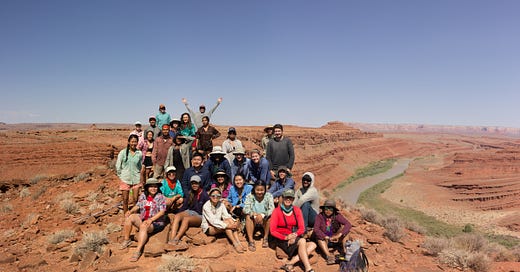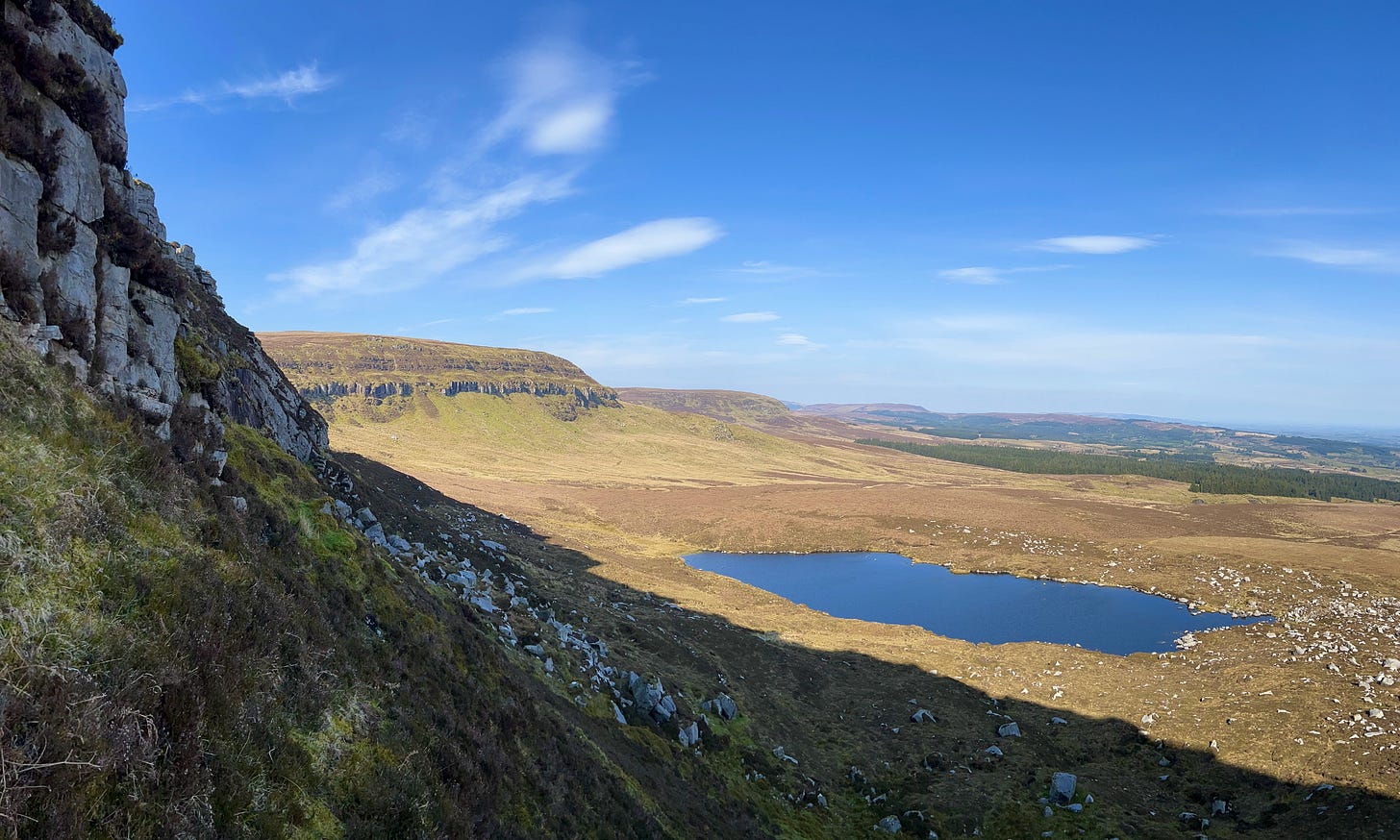I’m just returning from Ireland last week after a wonderful trip of family, friends, and agriculture/forestry regulations ;)
My great grandfather left this homeplace in 1922 as the Irish War for Independence concluded and the Irish Civil War began. The generous helping of bog (i.e. mostly) has left it a marginal agricultural area for many years — my aunt and uncle grew up in the house without electricity until the 1960s and without running water until the 1980s.
That lack of intensive development means this area is now one of the last relatively untouched areas in Ireland. I love climbing big, beautiful, snowy mountains, but I find a special joy returning to the side of this mountain, sketching plans for its regeneration.
In addition to more tedious regulatory stuff, trip highlights included plans to restore brown trout in the lake (pictured) and river, dreams to build a sauna out of an old stone house, and future retreats.
As always, use this form to suggest a project, interesting link, or open role.
This Week:
The Doris Duke Conservation Scholars Program
Links about colleges with work, apprentice, or internship requirements
Jobs Jobs Jobs
The Doris Duke Conservation Scholars Program (DDCSP)
The best part of APB was the people.
Students and staff brought with them so many incredible past communities and experiences that had made the concept of APB obvious to them — united by the idea that authentic, connected community was more important than ever during the pandemic, even if committing to build a new program felt like a big risk.
I loved learning about the different camps, scholarships, schools, and fellowships that informed how each community member showed up and what each asked for from their peers.
In the run up to our original fall semester, I took a lot of great calls with prospective students. One of my earliest calls was with a young woman named Jen who ended up joining us for that semester. During and after the call, I really admired Jen for the way she showed up in communities — APB, the BIPOC student community, her ecological community.
She told me a bit about her time in a fellowship called the Doris Duke Conservation Scholars Program, and I was floored by how erudite, optimistic, and rigorous Jen was in conversation about ecology and community.
I didn’t know who this Doris Duke person was, but, if they could make Jen that excited about Salmon, I figured she and that program were on the right track.
Doris Duke was a billionaire heiress who led a few different philanthropic efforts in the late 20th century. After she passed, her estate has been administered by the Doris Duke Charitable Foundation, and one of the pillars of its mission is to protect the environment, focusing on the conservation of land, water, and wildlife.
Within that broad mandate, the Foundation created the Conservation Scholars Program in the early 2010s in recognition of need for a new generation of environmental leaders more representative of US demographics.
When hiring instructors for the Spring Semester, I was delighted to see DDCSP on Mark Arenas’ resume, and, thankfully for all of us, he ended up accepting an offer to join the team at our new Front Range campus in Florissant, CO.
Mark created wonderful and curriculum that was deeply rooted in communities — indigeneity, sovereignty, non-human communities, and more. He is also delightful to be around.
When I heard that he had recently accepted a job at the DDCSP at the University of Washington, I took the opportunity to sit down with him and Dr. Melissa Mark, the director of the program at UWashington to learn more about how they approach seeding the next generation of environmental leaders.
DDCSP has had a few different structures, but, today, it fulfills its mission through three federated programs at the UWashington, UC Santa Cruz, and a Collaborative program composed of University of Florida, University of Arizona, University of Idaho, North Carolina State University, and the University of Massachusetts Amherst.
The UWashington and UCSC programs accept students from all over the country while the collaborative accepts students from their specific schools.
I love the way the UWashington program describes DDCSP:
The goal of the Doris Duke Conservation Scholars Program at the University of Washington is to promote biocultural conservation – a broad endeavor to preserve the integrity of communities, their interdependent members (both humans and other species), and the ecosystems in which they reside.
In DDCSP@UW, we center equity and inclusion in nature conservation by applying critical analysis to human interactions with lands, waters, and other species, and by being responsive to the needs and values of all communities. This program integrates multiple academic disciplines and ways of knowing, from a variety of conservation practitioners, to support scholars in finding a conservation practice and career path that is right for them.
Each program provides two years of summer programming with check ins throughout the year.
The first summer is an immersive experience, focused on connecting scholars as a cohort with communities and projects engaged in best-practice and cutting edge ecological and biocultural initiatives.
The second summer places students in internships at similar organizations, providing a kind of co-op-style training program for young conservation professionals.
In Mark’s words:
In college, I was a part of a social change program — it’s where I met all my closest friends, people who I still see today — and it was a very impactful part of my college experience. But participating in DDCSP helped me better understand how I could show up in community and better enact change in the communities I engaged in like that social change program.
In a similar vein, before I participated in the program, I was big into the science of biology and ecology, and DDCSP helped me understand how I needed to address the human and communal elements of environmental justice.
The program helped me:
Focus on issues in environmental and social justice: we were out learning about the past, present, and future impacts of uranium mining in the region.
Focus on stewardship: we supported a local organization's project work and we helped make a corral for horses, improved a community garden's wall by making adobe mix, and learned to shear sheep for wool!
Focus on building a connection to the outdoors through recreation: we kayaked down the San Juan.
Focus on community and belonging: We loved each other!
In Melissa’s words:
The DDCSP community is one that values all forms of knowledge and lived experiences, holds the same care and compassion for all beings- human or more than human-, and that honors multiple ways of knowing and being in this world.
Our mission from the Doris Duke Charitable Foundation is the conservation of land, water, and wildlife, and everyone connected with this program thinks about conservation as a collective effort to meet the needs of humans and other species in these ecosystems.
At DDCSP@UW we advocate that this can only happen through critical analysis of ourselves, our communities, and the systems in which we are embedded. Every year, what we talk about, who we meet with, where we visit, what internships we host, changes. Because our program is responsive to student needs and interests, and our values are based on compassion, curiosity, joy, honesty, integrity, and growth.
We build place-based appreciation and awareness of different modalities of conservation and examine connections between social justice, conservation, and identity as a foundation for building a personal conservation practice.
Because we are a reciprocal learning space, I learn, grow, and evolve with each new cohort of scholars, and I am always grateful to be a part of this community.
I did not have this type of support when I was in undergraduate or graduate school. I didn't even think entirely how much I needed this community until I found it. Academia, which was valuable in many ways, was also a system that failed me in many ways, even as I was successful in it. I didn't know how narrow it had made me, until this work gave me the space to expand.
I am always learning and unlearning, and what I hope I do for scholars is to support them along this journey as well, a little earlier than I found it. I want to help them access the tools that they will need to break out of the box the world might want to put them in, and to individually and collectively build the world they want to live in.
I walked away from my conversations even more obsessed with this program.
If you’re a current student who thinks this might be a good fit or organization that wants to offer internship opportunities to these wonderful cohorts of students, click here to learn more.
Links
Read about the DDCSP Collaborative here and the UC Santa Cruz program here.
Speaking of co-op-style education and training, at these US Colleges everyone works and there’s no tuition.
But the article leaves out Nunnian Programs like Deep Springs College, Thoreau College, Outer Coast College, and Tidelines Institute. Stay tuned for future newsletters on these schools.
Nunn’s original vision seems to find some modern resonance in the Dyson Institute of Engineering and Technology.
There’s also a really interesting version of this in Germany called the Duale Hochschule.
And more conventional colleges with co-op programs like Northeastern University and University of Waterloo.
Great Jobs
Albuquerque Academy (Albuquerque, NM)
Contract (School Year): Contractual Field Instructor
American Mountain Guides Association (Boulder, CO)
Full-time: Membership and Communications Director
City Year (Seattle, WA; Various)
Seasonal (School Year): Americorps Member
Cuyamaca Outdoor School (San Diego, CA)
Full-time (Starting Fall): Outdoor Education Specialist
Four Winds * Westward Ho (Deer Harbor, WA)
Seasonal (Summer): Barn Instructor
US National Whitewater Center (Charlotte, NC)
Seasonal (Summer): Outdoor Activities Intern
Part-time: Activities Guide
Full-time: Land Sport Operations Supervisor
Sanibel-Captiva Conservation Foundation (Sanibel Island, FL)
Full-time: Marketing Coordinator
Seasonal (6-month): Native Landscapes & Garden Center Internship
Student Conservation Association (East Bay, CA)
Seasonal (Summer): East Bay Regional Park Trail Corps Crew Leader
✌️
Ciarán




